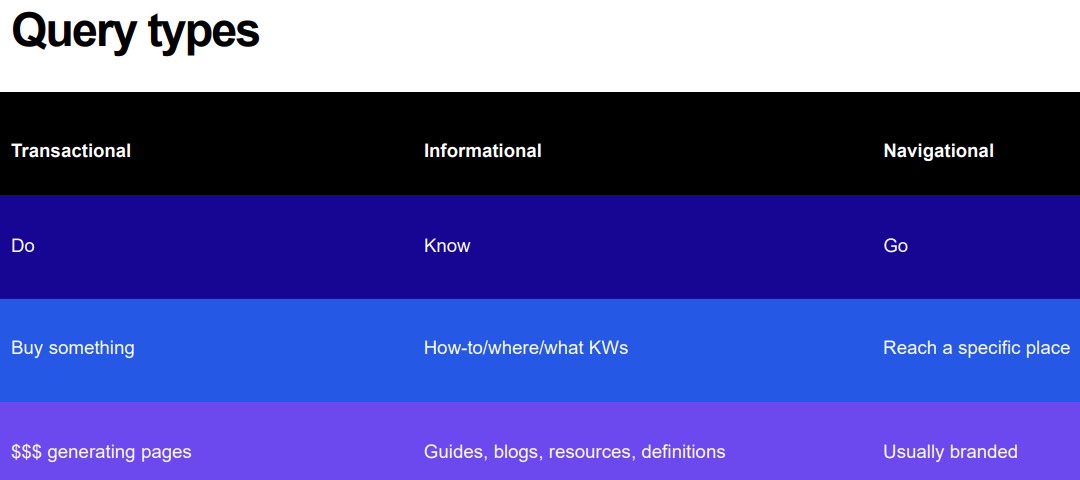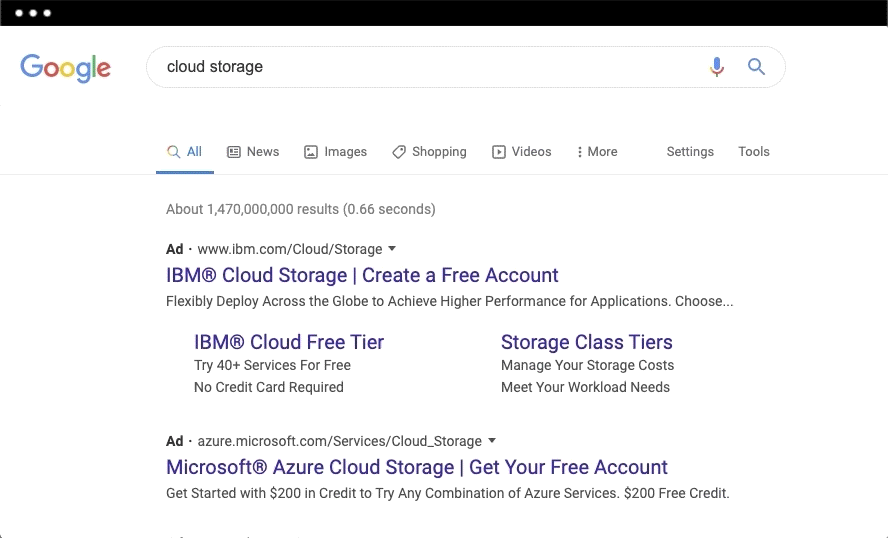Search engines evolve constantly. So, too, should your clients’ content strategy.
With so many Google core algorithm updates rolling out, understanding the SERPs is now more crucial than ever.
On March 11, I moderated a sponsored Search Engine Journal webinar presented by Idan Segal, Organic Growth Lead at Wix.com.
Segal offered actionable tips on how you can stay ahead of the curve when it comes to your clients’ content strategy.
Here’s a recap of the webinar presentation.

Why Intent Will Still Be Your Focus in 2020
While many things in the search landscape are evolving, intent will remain as an essential focus for SEOs and businesses this year.
Jeff Bezos said the following statement to his annual letter to Amazon shareholders back in 2017:
“One thing I love about customers is that they are divinely discontent. Their expectations are never static – they go up. It’s human nature. We didn’t ascend from our hunter-gatherer days by being satisfied. People have a voracious appetite for a better way, and yesterday’s ‘wow’ quickly becomes today’s ‘ordinary’. I see that cycle of improvement happening at a faster rate than ever before.”
As marketers, our goal is to educate our clients about the nature of SEO and how it works.
If our clients understand the complexity of the machine that we are facing – this ever-changing algorithm – then, it will be easier for us to carry out SEO campaigns.
Query Types
Search intent can be segmented into three categories: Do – Know – Go, which then correspond to three types of queries:
- Transactional queries
- “Buy something.”
- Money-generating pages in the SERPs.
- Informational queries
- How-to/where/what keywords.
- Guides, blogs, resources, definitions.
- Navigational queries
- Reach a specific place.
- Typically branded content.

There are also several “sub-intents” worth mentioning including:
- Comparison intent: “Best”,”versus” or review content – typically found in affiliate sites.
- Local intent.
- Inspirational intent.
Mixed SERPs: Where It Gets Tricky
It gets tricky when you have mixed search engine results pages (SERPs) where you have a mixture of all intents.
For instance, looking up the query “cloud storage” will return informative and transactional results.

Software and online products tend to be much more complex and therefore we often see mixed SERPs.
The same type of SERPs can be seen with the query “ticketing system” where you’ll see five product results and four informative results.
A good tip would be to identify and prioritize queries with “Buy” intent to get better ROI.
Ask the Right Questions
When we talk about intent, we need to ask the right questions:
- What are the goals of my audience?
- What tasks do they want to accomplish?
- Why would they want this content?
- In what stage of the funnel are they in?
- How does it relate to other topics my audience care about?
You need to know your clients’ niches better than anyone and conduct thorough research so you can plan whether to create informative, transactional, or navigational content.
Own Your Queries
You need to give users the specific journey that they are looking for.
Identify whether you currently rank for branded queries that can potentially result in traffic and conversions.
One good example is promo codes. Many aggregator sites have for all sorts of companies. But you have a better chance of owning and ranking “{Brand Name} promo code” queries.
You want people to choose the promo code from your own property.
Solve Problems
“I don’t want to call myself an SEO anymore. I feel more like a concierge of the web. When you’re lost, we’ll guide you to the best answer.” – Wil Reynolds, I’d Rather Be Thanked, Then Ranked / Mozcon 2017
What we need to do as marketers is to solve problems and bring great answers, even if it doesn’t sit well with our funnels.
Go the extra mile and supply a real solution.
And after giving them the perfect answer, you have the option to retarget them in a smart way.
Use SERP Hints to Improve Your Clients’ Strategy
Here are some tips to help you leverage the SERPs to enhance your clients’ content plan.
1. Learn From Your Competition
Someone probably already nailed it before you.
Research your clients’ top results on the SERPs.
If you dive into your competitors’ top results, you will understand what’s unique and how you can replicate their success.
2. Learn From Core Updates
Google works in mysterious ways. It rolls out core algorithm updates every so often.
Every core update holds surprises so make sure to take insights from each one of them.
Verify whether your website or vertical has been affected.
At the same time, don’t make rash decisions. It isn’t necessary to turn your strategy upside down whenever a core update rolls out.
3. Maximize the SERPs
Some SERPs are getting more local and it’s important to consider that when you’re making your estimations.
Aside from this, take advantage of other SERP features and placements including:
- Video carousel: Create videos for terms that trigger the video carousel.
- Affiliates: Affiliates are among the major players in the SERPs. If affiliates in your field are excluding you, then you’re doing something wrong.
- Sitelinks: When you Google a non-branded query and you see your result with four sitelinks below, you need to make sure that those pages give value, are optimized you and have the right internal linking to
your money pages. - FAQs.
Featured Snippets in a Post-Deduplication World
Bosses and clients want to know what the recent change in featured snippets means for their businesses.
So, are featured snippets still worth the effort?
The short answer is… yes!
The Wix team ran some internal tests comparing the average CTR of keywords receiving the featured snippet versus the first organic result.
They found that for product pages, having the featured snippets is still way valuable than ranking second.
Additionally, remember that the majority of voice search results are pulled from featured snippets so it’s still a big opportunity that shouldn’t be discounted.
You also have the alternative of preventing – or limiting – content from appearing in featured snippets as provided by Google.
It’s a smart move to conduct your own tests to see what works for you.
Use the SERP Free Cards
Today’s game is about topic clusters and adding layers of content that will help us understand the bigger picture.
Basically we are trying to predict what the search engine expects to see and “People also ask,” “Auto-suggest,” and “related searches” can be extremely valuable.
The SERP features from Google serve as “clues” that help us understand the related topics and ask the right questions.
Tools to Use
There are plenty of tools you can use to help you find what people search for:
Chrome extensions
- Keywords Everywhere
- Extract People also search phrases in Google
Free tools
- Answer the Public
- NGram Analyzer
- Word Cloud Generator
Paid tools
- Ahrefs Questions
- SEMrush Topic Research
Know Your Clients’ Clients
One way to do this is by looking at your clients’ PPC data. The Google Ads Search Terms report, for instance, is pure gold.
It can show you some untapped topics to cover and even help you discover a keyword with lower volume but converts much better.
Maybe it won’t change your mind completely, but it will help finetune your priorities.
You can also gain audience insights through:
- Talking to your clients’ customers.
- Online reputation management.
- Support knowledge.
The Era of Buzzwords: BERT & E-A-T
BERT
BERT (which stands for Bidirectional Encoder Representations from Transformers) is probably among Google’s most significant search improvements to date.
This update helped the search engine get much better at understanding content.
BERT helps machines understand nuances, context and surrounding text cohesion. In other words: understanding the way words fit together with structure and meaning.
While you can’t optimize for BERT, you can (and must) change your clients’ mindset. Help your client understand the complexity of the concept and the opportunities it brings.
Content and site structure are royalty in the era of BERT. And now that Google understands content better, it, therefore, understands links better.
E-A-T
E-A-T (Expertise, Authoritativeness, and Trustworthiness) are basically the three foundations of great content.
E-A-T is mentioned 135 times on Google’s search quality guidelines (a few months ago it was 186).
Ben Gomes, Google’s SVP, Search, News and Assistant, has this to say about their search quality rater guidelines:
“You can view the raters’ guidelines as where we want the search algorithm to go. They don’t tell you how the algorithm is ranking results, but they fundamentally show what the algorithm should do.”
Step up Your Content Game
Here are some tips to help you step up your content marketing efforts:
- Find the right ingredients for the recipe.
- Keep your internal linking relevant.
- Site architecture must make sense.
- Expertise will be valued even more.
- Content for the whole domain matters.
- Neutral help.
- Address ORM issues.
Blog Strategy: Less Can Be Much More
In her SMX West presentation in February, Lily Ray highlighted a great point that more marketers should consider doing.
“Stop producing content for the sake of producing content.”
Many companies are taking the “quantity over quality” approach when it comes to content creation. This needs to stop.
You need to prioritize quality. Users need your content to be useful.
Take the “library approach.” That is, if your blog relies on organic traffic, treat it as a library – an evergreen catalog of easy to access information.
It’s much more valuable than a feed of random blog posts.
Less Is More
Regular content audits will help you identify how your content is performing.
Consider merging, consolidating or removing old content as part of your strategy.
Low-quality pages may affect overall site authority. Start with pages that don’t bring in any traffic and have no referring domains.
Don’t forget to remove and update your internal links as well.
E-A-T Again
Are you producing content that displays expertise, authoritativeness, and trust?
Don’t be afraid to link externally to credible sources.
Invest in Writers
If your budget permits, investing in quality writers is ideal especially for international websites.
Your content writers should take the following into consideration:
- Grammar and punctuation: A lot of the content affected was by non-native speakers.
- Post structure: Better topics and hierarchy.
- Avoid repetitiveness.
- Don’t shove ideas down readers’ throats.
- Don’t rely too much on one source. Originality is important.
Localization – Not Translation
Instead of simply translating your English articles, localizing content is the way to go for international SEO.
The BERT algorithm is still behind for non-English SERPs but there are other NLP frameworks being developed for other languages.
Conversational search can scale and expect bigger changes to happen in this front.
Takeaways
- Manage client expectations by educating them.
- Mixed SERPs are here to stay. Plan accordingly.
- Intent, context, and relevance are the glue that connects keywords to topics.
- Give the people what they want – think answers, not funnels.
- BERT and E-A-T: Google is evolving, so should you.
- Don’t chase production in your blog, focus on depth
- Don’t translate, localize.
[Video Recap] How to Evolve Your Clients’ Content Strategy with Ever-Changing Algorithms
Watch the video recap of the webinar presentation and Q&A session.
Or check out the SlideShare below.
Join Us For Our Next Webinar!
Beyond ROAS: Aligning Google Ads With Your True Business Objectives
Join Justin Covington, Director of Paid Channels Solutions at iQuanti, as he breaks down the Google Ads changes and show you how to use value-based bidding to drive measurable results.
Image Credits
All screenshots taken by author, March 2020





![AI Overviews: We Reverse-Engineered Them So You Don't Have To [+ What You Need To Do Next]](https://www.searchenginejournal.com/wp-content/uploads/2025/04/sidebar1x-455.png)
